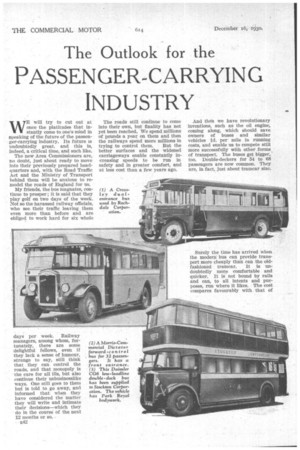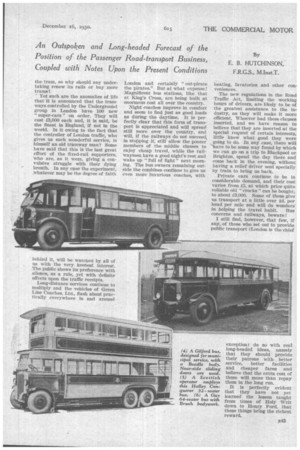The Outlook for the
Page 104

Page 105

If you've noticed an error in this article please click here to report it so we can fix it.
PASSENGER-CARRYING INDUSTRY
An Outspoken and Long-headed Forecast of the Position of the Passenger Road-transport Business, Coupled with Notes Upon the Present Conditions
By E. B. HUTCHINSON, F.R.G.S., Minst.T.
WE will try to cut out at once the platitudes that instantly come to one's mind in speaking of the future of the passenger-carrying industry. Its future is undoubtedly great, and this is, indeed, a critical time, and such like.
The new Area Commissioners are, no doubt, just about ready to move into their previously prepared headquarters and, with the Road Traffic Act and the Ministry of Transport behind them will be anxious to remodel the roads of England for us.
My friends, the bus magnates, continue to prosper ; it is said that they play golf on two days of the week. Not so the harassed railway officials, who see their traffic leaving them even more than before and are obliged to work hard for six whole days per week. Railway managers, among whom, fortunately, there are some delightful fellows, even if they lack a sense of humour, strange to say, still think that they can control the roads, and that monopoly is the cure for all ills, but also continue their unbusinesslike ways. One still goes to them but is told to go away, and informed that when they have considered the matter they will write and intimate their decisions—which they do in the course of the next 12 months or so.
E42 The roads still continue to come into their own, but finality has not yet been reached. We spend millions of poUnds a year on them and then the railways spend more millions in trying to control them. But the better surfaces and the widened carriageways enable constantly increasing speeds to be run in safety and in greater comfort, and at less cost than a few years ago. And then we have revolutionary inventions, such as the oil engine, coming along, which should save owners of buses and similar vehicles id. per mile in running costs, and enable us to compete still more successfully with other forms of transport. The buses get bigger, too. Double-deckers for 54 to 68 passengers are now common. They are, in fact, just about tramcar size.
Surely the time has arrived when the modern bus can provide transport more cheaply than can the oldfashioned tramcar. It is undoubtedly more comfortable and quicker. It is not bound by rails and can, to all intents and purposes, run where it likes. The cost compares favourably with that of the tram, so why should any undertaking renew its rails or buy more trams?
Yet such are the anomalies of life that it is announced that the tramways controlled by the Underground group in London have 100 new " super-cars " on order. They will cost 0,000 each and, it is said, be the finest in England, if not in the world. Is it owing to the fact that the controller of London traffic, who gives us such wonderful service, is himself an old tramway man? Some have said that this is the last great effort of the fixed-rail supporters, who are, as it were, giving a convulsive struggle with their dying breath. In any case the experiment, whatever may be the degree of faith
behind it, will be watched by all of us with the very keenest interest The public shows its preference with silence, as a rule, yet with definite effects upon the traffic receipts. Long-distance services continue to multiply and the vehicles of Green Line Coaches, LW., flash about practically everywhere in and around
London and certainly" out-pirate the pirates." But at what expense! Magnificent bus stations, like that at King's Cross, are being built at enormous cost all over the country.
Night coaches improve in comfort and seem to find just as good loads as during the daytime. It is perfectly clear that this form of transport is appreciated and will spread still more over the country, and will, if the railways do not succeed, in stopping it; still allow the poorer members of the middle classes to enjoy cheap travel, while the railwaymen have a good night's rest and wake up "full of fight" next morning. The bus owners remaining outside the combines continue to give us even more luxurious coaches, with heating, lavatories and other conveniences.
The new regulations in the Road Traffic Act, limiting the working hours of drivers, are likely to be of the greatest assistance to the industry, as they will make it more efficient. Whoever had these clauses inserted, and we have reason. to believe that they are inserted at the special request of certain interests, little knew what good they were going to do. In any case, there will "have to be some way found by which we can go on a trip to Blackpool or Brighton, spend the day there and come back in the evening, without having a relief driver sent specially by train to bring us back.
Private cars continue to be in considerable demand, and their cost varies from /5, at which price quite reliable old " crocks " can be bought, to about 0.000. Some of these give us transport at a little over id. per head per mile and will do wonders' in helping the travel habit. Bus concerns and railways, beware!
I still find, however, that few, if any, of those who set out to provide public transport (London is the chief exception) do so with real long-headed ideas, namely that they should provide their patrons with better service, better facilities and cheaper fares and believe that the extra cost of these will more than repay them in the long run.
It is perfectly evident that they have not yet learned the lesson taught from times of Holy Writ down to Henry Ford, that these things bring the richest reward.




















































































































































































